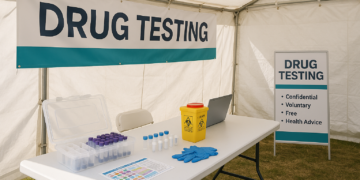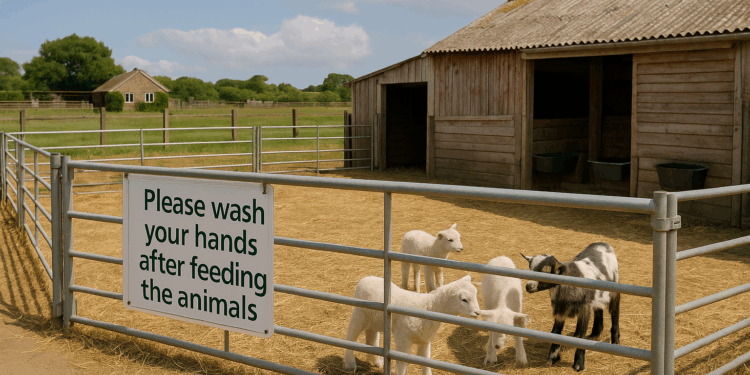Story Highlight
– 264 visitors fell ill from cryptosporidiosis outbreak.
– Breach of health and safety law admitted by farmer.
– Inadequate hygiene and supervision contributed to outbreak.
– Victims include many children, with ongoing health issues.
– Farmer fined £8,000 for safety violations.
Full Story
A farm situated on the Isle of Wight has faced legal repercussions following a significant outbreak of illness that affected 264 visitors, with many describing their symptoms as the most severe diarrhoea and vomiting they had ever experienced. The incident, which raised alarms about health safety standards in agricultural tourism, has led to serious discussions around farm safety protocols.
Sharon Wheeler, aged 60, who was overseeing bottle-feeding activities at Hazelgrove Farm in Ryde, acknowledged her violation of health and safety regulations after more than 30% of participants contracted cryptosporidiosis. This highly contagious illness is caused by the parasite Cryptosporidium, and it has been particularly harmful to children, with records indicating that over half of those affected were minors.
The outbreak occurred during a time when families were invited to engage in activities involving young animals, specifically lambs and goats, from April to May 2023. Reports of gastrointestinal issues among guests prompted a thorough inquiry led by the Health and Safety Executive (HSE) in collaboration with the UK Health Security Agency. The investigation revealed that approximately 2,400 tickets had been issued for the feeding sessions held between April 4 and May 1, raising concerns about the safety measures in place.
During the investigation, a number of deficiencies were uncovered. Key among these was the absence of a comprehensive risk assessment and the use of inadequate facilities for hand hygiene. Alarming details emerged, such as the continued provision of reusable cloth towels and inadequate oversight during the feeding activities. Investigators also noted that visitors were not sufficiently informed about the risks associated with zoonotic diseases, with instances where children were observed interacting closely with animals that were visibly contaminated with faeces.
Overall, 264 individuals reported symptoms typical of cryptosporidiosis, with around 5% needing to be hospitalised overnight. The repercussions of the outbreak extended beyond the immediate health challenges, with more than 1,250 school and work days lost as individuals were incapacitated by illness or had to care for affected family members. Even as the situation continued to unfold into 2024, some visitors were still grappling with ongoing gastrointestinal complications.
In a court session held on November 11, 2025, District Judge Galloway reflected on the severe consequences of the outbreak, recounting the emotional strain experienced by victims. He acknowledged the significant psychological impacts, including symptoms akin to post-traumatic stress disorder (PTSD), and recognised the potential life-threatening implications of the illness. Parents expressed deep concern over their children’s recovery prospects, illustrating the depth of fear and anxiety prompted by the outbreak.
Wheeler entered a guilty plea to an offence under Section 3(2) of the Health and Safety at Work etc. Act 1974. As a result, she received an £8,000 fine and was ordered to cover court costs amounting to £9,528.35. This has prompted calls for enhanced accountability and adherence to regulations within the agricultural sector, especially concerning visitor interactions with animals.
Francesca Arnold, an inspector with the HSE, emphasised the critical need for farmers to thoroughly understand and manage health risks related to animal encounters. She stated, “If the zoonotic risks had been properly controlled this incident could have been avoided.” Arnold further highlighted that the implementation of safe practices could significantly mitigate risks while still providing enjoyable and educational experiences for visitors.
Zoonotic diseases, such as cryptosporidiosis, can pose serious health threats, particularly to young children and individuals with compromised immune systems. The transmission of Cryptosporidium occurs through the ingestion of small amounts of contaminated faeces or saliva, highlighting the urgent need for effective hygiene and supervision in settings where animals are present.
In light of these events, guidance has been made available on the Access to Farms website, which includes an Industry Code of Practice aimed at preventing or controlling health issues stemming from animal contact at visitor attractions. This code, developed in partnership with the HSE, outlines practical safety measures and provides a checklist for farm operators to ensure the well-being of both visitors and animals.
The prosecution of Hazelgrove Farm was brought forth by enforcement lawyers Robert James and Kate Harney, with support from paralegal officer Stephen Grabe, further underscoring the critical importance of regulatory compliance in maintaining public health standards at agricultural sites. Such cases serve as a grim reminder of the potential health risks inherent in farm visits, and they reinforce the necessity for stringent safety measures to ensure that the enjoyment of animal interactions does not come at the expense of public health.























This case underlines the importance of robust biosecurity and visitor hygiene measures at sites where the public interact with animals. Proper hand-washing facilities, clear signage about risks, supervised petting areas and staff trained to manage infection control are basic but essential controls that should be in place. Operators must undertake risk assessments, implement practical measures to protect vulnerable groups and keep records to show they are meeting their duty of care. Enforcement sends an important message that lapses can cause real harm and will be taken seriously.
This outcome is a stark reminder that visitor safety must be at the heart of any farm open to the public. The scale of illness shows what can happen when basic hygiene and risk awareness are not provided. Farms need accessible hand washing facilities, clear signage about risks and supervising arrangements to protect children and other vulnerable visitors. Regular risk assessments, staff training and a culture that treats biosecurity and public health as core responsibilities would help prevent repeats of this incident.
This incident is a stark reminder that farms open to the public must prioritise basic infection prevention measures. Adequate hand-washing facilities, clear signage about hand hygiene, effective staff training on zoonotic risks and active supervision in animal areas are essential to protect visitors, especially children. Regular risk assessments and prompt corrective action when deficiencies are found can prevent harm and avoid costly enforcement action. Facilities offering close contact with animals should review and strengthen their health and safety arrangements to restore public confidence and reduce the risk of future outbreaks.
This case is a stark reminder that basic hygiene and clear risk management are non negotiable when the public visits working farms. Ensuring adequate hand-washing facilities, providing prominent guidance on animal contact, and training staff to enforce safe practices are simple but essential measures that would have reduced the harm here. Operators must treat biosecurity and visitor safety as core responsibilities, not optional extras, to prevent infections and protect vulnerable visitors.
This case is a stark reminder that farms open to the public must treat biosecurity and basic hygiene as non negotiable. Failure to provide adequate hand washing facilities and to inform visitors of risks, especially when children are involved, creates predictable harm. The fine and HSE findings are justified, but prevention is better than enforcement: clear signage, supervised hand washing, accessible hand cleaning stations with soap and running water, and staff trained to manage animal contact and respond to concerns would reduce risk substantially. Operators should also carry out simple risk assessments, communicate risks to visitors before entry, and review procedures after any illness reports to prevent recurrence.